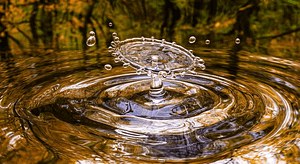
I don’t remember what town we were in, but “hard water” meant we had to use a lot more detergent. My mother spent a lot of time cleaning salt residue out of the bathtub and faucets. Then we moved to another country and were introduced to “soft water”. The clean water tasted a little strange, but that wasn’t the main problem. Our approaches took some time to acclimate, but our mother was happy with the small amount of detergent, dish soap, and shampoo we had to use.
What Is “Hard” Water?
 Hard water is supposed to be formed due to a high concentration of minerals in the water. It usually contains dissolved substances of calcium and magnesium, perhaps as carbonates or sulfates. Although there is no single global standard for measuring hardness, water hardness courses established by the U.S. Geological Survey are generally recognized.
Hard water is supposed to be formed due to a high concentration of minerals in the water. It usually contains dissolved substances of calcium and magnesium, perhaps as carbonates or sulfates. Although there is no single global standard for measuring hardness, water hardness courses established by the U.S. Geological Survey are generally recognized.
It’s great for washing clothes. Your iron and dishwasher may thank you personally, but your body will not. The salt (sodium) in the water will increase your cravings the longer you eat. Hard water doesn’t hurt. If you are not used to drinking hard water – for example, if you have recently moved to an area with hard water – you will experience some gastrointestinal problems until your system gets used to the new H20.
Is Hard Water Temporary or Permanent?
Permanent hardness is caused by the presence of sulfates and/or chlorides of calcium and magnesium in the water. However, despite its name, hardness can be decreased. Hard water can cause scaling in sinks and bathtubs and unsightly rings in flower pots. TV commercials make it look so easy, but believe me, it’s not. It can take a lot of time, and products before the exteriors are “miraculously” clean of stains. Make sure you don’t overstay your welcome, though, because you don’t want your bedding or clothes to smell like cucumber.
Do I Need a Water Softener?
 Installing a water softener in your home can be expensive. So, unless you have problems with iron bacteria, it’s best not to use a water conditioner. In commercial settings, hard water can be a real problem. Mineral deposits can also cause the metal components of the boiler to overheat and cause them to break. Assuming your water comes from a treatment plant, it should be safe to drink, but it still should be routinely tested.
Installing a water softener in your home can be expensive. So, unless you have problems with iron bacteria, it’s best not to use a water conditioner. In commercial settings, hard water can be a real problem. Mineral deposits can also cause the metal components of the boiler to overheat and cause them to break. Assuming your water comes from a treatment plant, it should be safe to drink, but it still should be routinely tested.
I vouch for the safety of drinking water. I prefer hard and soft water for eating. This water can be problematic, as most households only have access to one source. Those are from the local municipality or town, through their well or cistern, or, in regions of northern Alberta, with a dugout (an artificial air intake cistern). When deciding on the best alternative, ask friends and acquaintances for recommendations if possible, especially if they have the same type of water as you. Do your homework: consider your options carefully before choosing a system or company.
